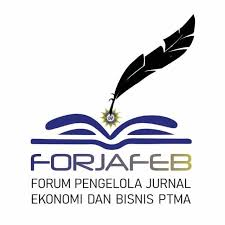Sikap, Norma Subjektif, Kontrol Perilaku, Komitmen Organisasi, dan Budaya Organisasi: Menguji Niat Whistleblowing
Indonesia
DOI:
https://doi.org/10.32534/jpk.v11i3.6258Kata Kunci:
Teori Planned of Behaviour, Komitmen Organisasi, Budaya Organisasi, WhistleblowingAbstrak
The background of this research is that corruption is still a problem in every country. ACFE every year still provides reports on cases that occur in the world. One that can detect cases with reports from whistleblowers. ACFE reports every year that reports from whistleblowers are more effective. There is an increase in cases revealed due to whistleblowing. The purpose of this study was to determine whether attitudes, subjective norms, behavioral control, organizational commitment, organizational culture affect a person's intention to do whistleblowing. The research method used is quantitative research by distributing questionnaires, the population in this study are employees in various divisions including the finance, bookkeeping, IT, HRD divisions with the results showing that attitudes, subjective norms, behavioral control, organizational commitment, and organizational culture affect a person's intention to whistleblowing. The conclusion of this study is that the higher the attitude, subjective norms, behavioral control, organizational commitment, and organizational culture, the higher one's intention to whistleblowing.
Keywords: Planned of behavior’s theory, Organizational Commitment, Organizational Culture, Whistleblowing
Unduhan
Referensi
ACFE. (2024). The Nations ® Occupational Fraud 2024: 2 Foreword Occupational Fraud 2024: A Report To The Nations.
Ahmad, H. (2019). Pengaruh Sikap Perilaku, Norma Subjektif, Persepsi Pengendalian Perilaku Pada Intention Whistleblowing (Studi Pada Kantor Akuntan Publik di Kota Malang).
Ajzen, I. (1991). The Theory of Planned Behavior. Organizational Behavior and Human Decision Processes, 50(2), 179–211. https://doi.org/10.1016/0749-5978(91)90020-T
Anggraeni, N., Sailawati, & Elok, N. (2021). Pengaruh Whistleblowing System, Sistem Pengendalian Internal, Budaya Organisasi, dan Keadilan Organisasi Terhadap Pencegahan Kecurangan. Jurnal Akuntansi Keuangan Dan Bisnis, 14(1), 2021. https://jurnal.pcr.ac.id/index.php/jakb/
Aulia, S., Primasari, D., & Azhar, S. (2019a). Pengaruh Budaya Organisasi, Komitmen Organisasi, dan Retaliasi Terhadap Intensi Whistleblowing. Jurnal Profita, 12(3), 395. https://doi.org/10.22441/profita.2019.v12.03.003
Aulia, S., Primasari, D., & Azhar, S. (2019b). Pengaruh Budaya Organisasi, Komitmen Organisasi dan Retaliasi Terhadap Intensi Whistleblowing. Jurnal Profita, 12(3), 395. https://doi.org/10.22441/profita.2019.v12.03.003
Dimitrijevic, D., Jovkovic, B., & Milutinovic, S. (2020). The scope and limitations of external audit in detecting frauds in company’s operations. Journal of Financial Crime, 28(3), 632–646. https://doi.org/10.1108/JFC-11-2019-0155
Gao, L., & Brink, A. G. (2017). Whistleblowing studies in accounting research: A review of experimental studies on the determinants of whistleblowing. Journal of Accounting Literature, 38, 1–13. https://doi.org/10.1016/j.acclit.2017.05.001
Hadinata, S., & Mustika Azzahrah. (2021). Peran Reward dan Komitmen Organisasi Terhadap Niat Whistleblowing: Sebuah Studi Eksperimen. Akurasi : Jurnal Studi Akuntansi Dan Keuangan, 4(1), 11–30. https://doi.org/10.29303/akurasi.v4i1.56
Indra, S. (2018). Analisis Persepsi Mahasiswa Terhadap Niat Melakukan Whistleblowing. Jurnal Penelitian Ekonomi Dan Bisnis, 3(1), 1–11. http://www.jpeb.dinus.ac.id
Indriani, M., Yulia, A., Nadirsyah, N., & Ariska, L. P. (2019). Whistleblowing Intention, Personal Cost, Organizational Commitment and Fraud Seriousness Level. Journal of Accounting and Investment, 20(2). https://doi.org/10.18196/jai.2002121
Kanojia, S., Sachdeva, S., & Sharma, J. P. (2020). Retaliatory effect on whistle blowing intentions: a study of Indian employees. Journal of Financial Crime, 27(4), 1221–1237. https://doi.org/10.1108/JFC-12-2019-0170
Karpacheva, E., & Hock, B. (2024). Foreign whistleblowing: the impact of US extraterritorial enforcement on anti-corruption laws in Europe. Journal of Financial Crime, 31(1), 1–13. https://doi.org/10.1108/JFC-11-2022-0283
Kassimova, M., Omarov, Y. A., Zhilkaidarov, R. R., Abulgazin, Y. S., & Sabitova, A. A. (2023). Investigative prevention of corruption crimes. Journal of Financial Crime, 30(1), 254–265. https://doi.org/10.1108/JFC-11-2021-0252
Kelley, H. H., & Michela, J. L. (1980). Attribution Theory and Research. www.annualreviews.org
Krambia-Kapardis, M. (2020). An exploratory empirical study of whistleblowing and whistleblowers. Journal of Financial Crime, 27(3), 755–770. https://doi.org/10.1108/JFC-03-2020-0042
Maulana, I. (2016). Pengaruh Sikap dan Persepsi Kontrol Perilaku Terhadap Niat Whistleblowing Internal-Eksternal dengan Persepsi Dukungan Organisasi Sebagai Variabel Pemoderasi. Jurnal Akuntansi Dan Investasi, 17(2), 209–219. https://doi.org/10.18196/jai.2016.0056.209-219
Neuman, W. L. (William L. (2014). Social Research Methods : Qualitative and Quantitative Approaches (Seventh Edition). Pearson.
Nortje, J. G. J. (2023). The protection of whistleblowers in South African criminal cases. In Journal of Financial Crime (Vol. 30, Issue 6, pp. 1444–1457). Emerald Publishing. https://doi.org/10.1108/JFC-09-2022-0234
Nwosu, E. O., Nwoke, U., Ajibo, C. C., Nwodo, F., & Okoli, I. (2021). Mainstreaming whistleblowing as a regulatory mechanism against fraud in Nigeria’s capital market. Journal of Financial Crime, 28(4), 1008–1021. https://doi.org/10.1108/JFC-10-2020-0209
Owusu, G. M. Y., Bekoe, R. A., Anokye, F. K., & Okoe, F. O. (2020a). Whistleblowing intentions of accounting students: An application of the theory of planned behaviour. Journal of Financial Crime, 27(2), 477–492. https://doi.org/10.1108/JFC-01-2019-0007
Owusu, G. M. Y., Bekoe, R. A., Anokye, F. K., & Okoe, F. O. (2020b). Whistleblowing intentions of accounting students: An application of the theory of planned behaviour. Journal of Financial Crime, 27(2), 477–492. https://doi.org/10.1108/JFC-01-2019-0007
Park, H., & Blenkinsopp, J. (2009). Whistleblowing as planned behavior - A survey of south korean police officers. Journal of Business Ethics, 85(4), 545–556. https://doi.org/10.1007/s10551-008-9788-y
Robiansyah, S. E. (2021). Perilaku Organisasional.
Rustiarini, W., & Sunarsih, M. (2017). Factors Influencing the Whistleblowing Behaviour: A Perspective from the Theory of Planned Behaviour. In Asian Journal of Business and Accounting (Vol. 10, Issue 2).
Salsabilla, C. R., & Erinos. (2023). Pengaruh Sikap, Kontrol Perilaku dan Religiusitas terhadap Niat Melakukan Whistleblowing. JURNAL EKSPLORASI AKUNTANSI, 5(2), 479–494. https://doi.org/10.24036/jea.v5i2.670
Smaili, N., & Arroyo, P. (2022). Triggering changes in corporate governance: before and after external whistleblowing. Journal of Financial Crime, 29(3), 1027–1041. https://doi.org/10.1108/JFC-06-2021-0134
Stolley, K. S. (2005). The Basics of Sociology. Greenwood Press.
Sugiyono. (2013). Metode Penelitian Kuantitatif Kualitatif dan R&D. Penerbit Alfabeta Bandung.
Syafitri, S., & Syafdinal. (2023). Pengaruh Sistem Pengendalian Internal dan Whistleblowing System terhadap Pencegahan Fraud Pengadaan Barang dan Jasa. 7(1), 2548–7507. https://doi.org/10.33395/owner.v7i1.1446
Tarjo, T., Suwito, A., Aprillia, I. D., & Ramadan, G. R. (2019). Theory of Planned Behavior and Whistleblowing Intention. Jurnal Keuangan Dan Perbankan, 23(1). https://doi.org/10.26905/jkdp.v23i1.2714
Teichmann, F. M., & Falker, M. C. (2020). Whistleblowing Incentives. Journal of Financial Crime, 28(2), 394–405. https://doi.org/10.1108/JFC-10-2019-0132
Triantoro, H. D., Utami, I., & Joseph, C. (2020). Whistleblowing system, Machiavellian personality, fraud intention: An experimental study. Journal of Financial Crime, 27(1), 202–216. https://doi.org/10.1108/JFC-01-2019-0003
Tuan Mansor, T. M., Ariff, A. M., Hashim, H. A., & Ngah, A. H. (2022). Whistleblowing intentions among external auditors: an application of the moderated multicomponent model of the theory of planned behaviour. Meditari Accountancy Research, 30(5), 1309–1333. https://doi.org/10.1108/MEDAR-07-2020-0948
Wahyuningtiyas, T. N., & Pramudyastuti, O. L. (2022). Optimalisasi Whistleblowing System Melalui Peran Whistleblower Dalam Pendeteksian Tindakan Fraud: Sebuah Literature Review. https://doi.org/10.37641/jiakes.v10i1.1385
Wardah, Z., Carolina, A., & Wulandari, A. (2022a). Pengaruh Whistleblowing System, Internal Control, Leadership dan Budaya Organisasi terhadap Fraud Prevention. Nominal Barometer Riset Akuntansi Dan Manajemen, 11(1), 1–14. https://doi.org/10.21831/nominal.v11i2.49346
Wardah, Z., Carolina, A., & Wulandari, A. (2022b). Pengaruh Whistleblowing System, Internal Control, Leadership dan Budaya Organisasi terhadap Fraud Prevention. Nominal Barometer Riset Akuntansi Dan Manajemen, 11(1), 1–14. https://doi.org/10.21831/nominal.v11i1.36986
Yayang, R., & Pujiningsih, S. (2021). What Factors Affect Students’ Whistleblowing Intentions? Jurnal Studi Akuntansi Dan Keuangan, 4(2), 151–162.
Unduhan
Diterbitkan
Terbitan
Bagian
Lisensi
Hak Cipta (c) 2024 Ester Ananda Heriana, Andri Prastiwi

Artikel ini berlisensi Creative Commons Attribution 4.0 International License.




















